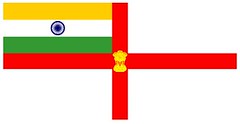 While we often seem mired in the fantasies and fetishes of the transformationalists and political social theory, the rising powers are taking a cold, serious, fact based view of the Maritime Domain.
While we often seem mired in the fantasies and fetishes of the transformationalists and political social theory, the rising powers are taking a cold, serious, fact based view of the Maritime Domain.From The Economist - behold the Neo-Mahanians.
Mahan was a founding father of geopolitics, in particular the notion that geography—poring over maps—should inform foreign policy more than any other consideration. It was the wine-dark sea that interested him most. His book, “The Influence of Sea Power Upon History”, was self-fulfilling, helping sea power shape history, though not for the better. Mahan concluded that command of seaborne commerce was the key to winning wars, and that what was needed was an “overbearing power on the sea which drives the enemy’s flag from it”. Wilhelm, the German Kaiser, loved the book, once saying he was trying to learn it by heart. The naval arms race between Germany and Britain that followed was both catastrophic and avoidable.There is very good and sound reasons. They just now are starting to have the ability - why not see the obvious.
The understanding of sea power has since evolved, yet Mahan is now hugely admired in Asia’s two most populous powers. Banyan was recently in Singapore for the Shangri-La Dialogue, run by the International Institute for Strategic Studies, a London think-tank. It seems Britain’s former naval dominance of Asia has been forgiven or forgotten (or perhaps is recalled with admiration), for this forum is where defence types now get together with old friends and future foes. And whenever Banyan prodded a military man from India or China, out leapt a Mahanite.
Despite the global slump, Asian growth continues. More than four-fifths of crude oil bound for ChinaClear, precise fundamentals.crosses the Indian Ocean before passing through the narrow Malacca Strait. Vast ship-borne imports of iron ore, coal and bauxite make up other raw ingredients for Chinese growth. India imports four-fifths of its oil, mostly from the Persian Gulf, plus liquefied natural gas from Qatar and Indonesia. Writing in Foreign Affairs, Robert Kaplan, an American journalist, whose poring over maps also suggests Mahanite tendencies, describes the whole Indian Ocean seaboard as “a vast web of energy trade”. Global energy needs are expected roughly to double by 2030, with India and China accounting for nearly half of the new growth in demand. Maritime security concerns are inevitable and legitimate.
...strategists gaze at maps and conjure up evil shapes. For Japanese imperialists (also Mahan fans), the Korean peninsula was a dagger at Japan’s heart; for Chinese strategists it is a threatening “bridgehead”. As for the Indian subcontinent, it is, in this Chinese analysis, “akin to a massive triangle reaching into the heart of the Indian Ocean” or, like Japan and Taiwan, “a giant and never-sinking aircraft-carrier”. India, in turn, espouses its own “Monroe doctrine”, demanding that outsiders keep out of its backyard. So it decries China’s “string of pearls” (roads, pipelines and ports being built in friendly countries around the Indian Ocean) as a provocation. Rivalry is helping drive a build-up of naval arms: three new aircraft-carriers for India; new destroyers, submarines and hints of an aircraft-carrier programme for China.It is our heritage and inheritance earned with the blood of those who went before. If we don't want it - others will.
Mercifully, it is not all preordained to end in a rerun of 1914. The task of economic development concentrates Chinese and Indian minds at home. Smaller Asian navies are expanding as a counterbalance to the big powers, and they have an interest in keeping hands off the choke-point of the Malacca Strait. And America remains the defining force in Asia, able for now to enforce the peace. But, even if history never repeats itself, the persistence of Mahan’s doctrines suggests the past likes to have a try.
There has yet to be a purge of the transformationalists in spite of their failures - failures you can let pass in a Navy at peace (which at sea is how we act). The Navy has not had the brutal quality cut that warfare has brought in a large measure to the Army, forcing them to turn to the war as it is instead of the war as they wish it was (see MRAP vs. Crusader vs. unarmored HUMVEE vs. return of the 7.62x51 etc).
Focus.
As a side-bar, two NWC authors are quoted in the article. James Holmes and Toshi Yoshihara. They have a book out together, Chinese Naval Strategy in the 21st Century: The Turn to Mahan









No comments:
Post a Comment